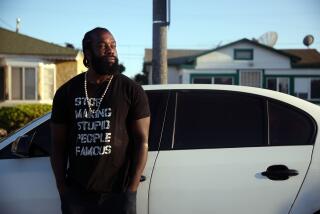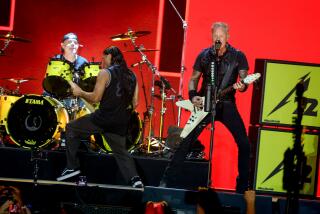O.C. Pop Music Review / MIKE BOEHM : Revived Traffic: Not Far From Home After All : The Band’s Ability and Its Engagement With the Music Make a Comeback Justified
- Share via
ANAHEIM — There was no great sense of occasion, no buzz of anticipation as the reunited Traffic arrived at The Pond of Anaheim Tuesday night.
There was no great thematic subtext to lend fresh meaning to songs from more than 20 years ago: Traffic was always more about jams and tunes than lyrical ideas.
There wasn’t any essential new material to play, the revived band’s “Far From Home” album having a lot more in common with the tired ramblings of Steve Winwood’s last two solo releases than with the adventurous spark of Traffic’s prime years in the late ‘60s and early ‘70s.
There wasn’t even a close-to-capacity crowd, which perhaps was inevitable for a classic-rock band arriving a few days after the Eagles had finished sucking something on the order of $8 million to $9 million in concert grosses out of the Southern California market.
But the youthful-looking Winwood, his worn and craggy old sidekick Jim Capaldi and their four supporting recruits managed to make a convincing case in favor of Traffic’s rekindled existence. Their collective argument was simple and straightforward: good singin’, good playin’, good energy, good songs.
The audience didn’t begin to stand and roar with approval until halfway through the two-hour show, when “Empty Pages” launched a closing string of some of the band’s best-loved nuggets. But the vital signs were strong from the opening numbers, “Pearly Queen” and “Medicated Goo,” two ‘60-vintage songs that found Traffic playing both bluesy and funky, showing a sharp group cohesion but also enough of a limber quality to free the show from the dull neatness of the “Far From Home” album (not to mention the live snooze-athon that was Winwood’s show at the Pacific Amphitheatre three years ago).
The new album was acknowledged but not belabored. Early on, Traffic played three of the stronger songs in succession: the bluesy “Here Comes A Man,” the funky “Some Kinda Woman” (with its echoes of Winwood’s leading mentor, Ray Charles--who plays in Costa Mesa tonight) and “Every Night, Every Day,” a slight but serviceably bopping take on the Memphis soul sound.
Questionable selections bogged Traffic down during the middle of the show.
Winwood’s splendid, cleanly etched guitar playing partly redeemed the slogging, self-descriptive plaint “(Sometimes I Feel So) Uninspired” (the only song taken from “Shoot Out at the Fantasy Factory,” the album that began Traffic’s decline in 1973. The band’s farewell album from 1974, “When the Eagle Flies,” was skipped altogether in a set that drew seven of its 13 oldies from the early ‘70s albums “Low Spark of High-Heeled Boys” and “John Barleycorn Must Die,” and only one or two songs each from the band’s first three releases).
“Nowhere Is There Freedom,” the fourth (and least, and thankfully last) new selection, and “Forty Thousand Headmen”--dedicated to Chris Wood, the Traffic sax and flute player who died in 1983--finished the too-long stretch of placid songs.
Those choices were especially questionable given that Traffic left out such vibrant songs as “Heaven Is in Your Mind” and “Coloured Rain,” two brilliant examples of ‘60s psychedelic rock wrought with pure-pop buoyancy, rather than with the genre’s more typical druggy droning.
Otherwise, Traffic scored on the strength of a fine catalogue and excellent all-around musicianship. Winwood may not be “pound for pound the best musician on the planet,” which is how Capaldi introduced him. But it’s hard to think of a rock musician who can surpass his combined abilities as a singer, a guitarist and a piano and organ player.
Each facet was given its due. Vocally, his instantly soulful voice has lost nothing. As a guitarist, he shares the firm blues grounding, good taste, and tonal presence of Eric Clapton, his once-upon-a-time band mate in Blind Faith. His piano workouts on “Empty Pages,” “Low Spark of High-Heeled Boys” and “Glad” were inventive improvisations that didn’t merely replay the old-familiar parts.
*
Capaldi and Walfredo Reyes traded off between trap drum and conga percussion slots; along with bassist Rosko Gee, they kept the rhythm churning and percolating nicely. (Capaldi also stepped out front to give good, gruff-voiced renditions of “Rock & Roll Stew” and “Light Up or Leave Me Alone,” the two earthy rockers he sang on the “Low Spark” album). Randall Bramblett did a close Chris Wood impersonation with distorted saxophone solos and fluttering, piercing flute sallies.
The show involved little chatter and less stagecraft, but neither was greatly missed. Winwood, never a flamboyant showman, left what few announcements needed to be made to Capaldi (among them: the song dedication to the late Wood and, near the end of the show, “thanks for waiting 20 years”). Slides of minimalist paintings and the inevitable psychedelic sloshing and swirling of colors were projected on a screen behind the band.
The playing was the thing, and it was enough. It yielded such peak moments as a truly explosive “Dear Mr. Fantasy” in which Winwood’s probing, cutting guitar lines and impassioned singing set a standard of achievement for returning rockers trying to recapture a spark. Also notable was the driving conclusion to “Freedom Rider,” in which the band courted chaos (again, that defeating fastidiousness was flung far out the window).
The only song not originally done by Traffic was the stomping show closer, “Gimme Some Lovin’.” This barn-burner from Winwood’s first prominent band, the Spencer Davis Group, rolled along on new rhythmic tracks that were part Bo Diddley hambone beat, part Latin groove, and part country train-rhythm.
Like the Allman Brothers Band in its strong ‘90s stage comeback, Traffic was worth hearing even without new material that could match its most glorious past. Entering the show with two strikes against it, Traffic scored a hit with its ability and its engagement with the music. In the end, even a skeptic had to agree that a line from the show-closing refrain could sum up the live aspect of the group’s 20-year reunion: So glad you made it.
*
The opening act was Sonia Dada, a group from Chicago that issued its debut album in 1992 but is trying to start over now that its label, Chameleon Records, is kaput.
The oddly named R&B; band resembles that other even more oddly named Midwestern R&B-rock; band Was (Not Was). Both have gifted, harmonizing soul singers out front, but Sonia Dada lacks the quirky vision of the Was band, and its instrumental backup often was heavy-handed, long on routinely shrieking, note-shredding blues-rock guitar solos.
The band clicked when the players got out of the way and performed with efficient restraint, leaving the spotlight on Michael Scott, who brought a piercing, almost otherworldly tenor wail to the concluding “Jungle Song,” and Paris Deland, who contributed the kind of deep, resonant bass singing that Melvin Franklin made famous in the Temptations, and sang smooth falsetto backups. Sam Hogan, an effective rasper, completed the promising vocal front line.
More to Read
The biggest entertainment stories
Get our big stories about Hollywood, film, television, music, arts, culture and more right in your inbox as soon as they publish.
You may occasionally receive promotional content from the Los Angeles Times.











